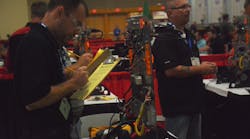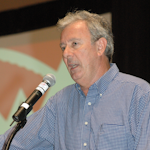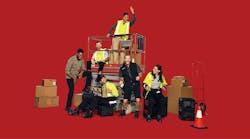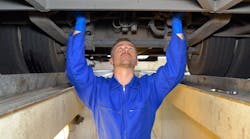The Technology & Maintenance Council's TMCSuperTech 2018 Technician Skills Competition is now in the books. What did we learn from this event?
First, all of the first-place winners in the four competitions of this year’s TMCSuperTech – which includes the traditional heavy duty diesel technician track, the TMCFutureTech student track, the trailer track and the light/medium duty technician track (new this year) – were all first-time winners.
All of the individual competitions had a combination of specific skills that these technicians perform on a regular basis, as well as a series of skills that, at times, we may not place near the emphasis we should.
I refer to these skills that aren’t necessarily used on a regular basis as the “assumed skills.” Assumed skills include some of the following categories: fasteners, precision measuring, torque and reading wiring diagrams. These skills are not normally tested, but are very important to the technician’s ability to perform specific tests and proper procedures in the diagnosis and repair of vehicles.
Electrical systems skills
In all of our competitions, TMC has had multiple stations that incorporate electrical systems, including stations such as electrical meters, trailer lighting, engine electrical, aftertreatment, HVAC and electrical circuits. By having different stations requiring the participants to demonstrate their electrical and/or use of meter skills, TMC is able to better understand any potential trends or areas the competing technicians may be proficient or need improvement in.
This year we had a station testing for skills with electrical meters measuring current flow (amperage) and, let’s just say, we blew a lot of fuses. Some technicians might measure voltage and resistance/continuity, but current flow is also important to completely understanding a circuit's ability to flow electricity through a wire and ensure the wire and circuit can handle the amperage.
Engine aftertreatment
Aftertreatment is the topic of many conversations regarding vehicle maintenance these days. With that, TMC has ramped up station involvement in this area. Everyone except for trailers contestants completed an aftertreatment station. We expanded the aftertreatment station this year to FutureTech contestants, as well as the light/medium duty competition. We plan to continue to increase activities related to aftertreatment next year.
Expect aftertreatment to expand to multiple stations next year, like we have done with electrical. By expanding the number of stations that incorporate aftertreatment, or other areas of concern to the industry, we are able to gather additional data and have a better understanding of possible gaps in training and the actual ability of technicians to diagnose and repair these systems.
In addition, on the gasoline side with the light/medium duty track, there was a station called “EVAP” (evaporative emission systems). Participants were given a vehicle with an illuminated “Check Engine” light and were required to diagnose and find the cause of why the light was on.
Demonstration areas
This year we had two demonstration areas. These stations were designed to gather the technician’s knowledge and understanding, or concerns and processes, in either new or emerging technology. These stations are not scored as part of the participants’ overall score.
For instance, for the second year, TMCSuperTech had a cybersecurity station and continues to see an increase in the role that plays in the companies and shops. The scenario presented to participants involved a truck which stopped running and was towed into the company, but no issues were found with the vehicle. The company was then contacted to wire money to an off-shore account or the truck would remain non-functional. What would they do next?
The competition also had a “Right to Know” station designed to help heavy duty truck technicians understand and utilize a NASTF (National Automotive Service Task Force) Service Information Request. This process was created to give technicians a venue to share information on gaps they have found in service information or scan tool availability.
Over time and as the need for skills and procedures in these areas increases, these stations may become part of the competition.
Students and professionals
The TMCFutureTech competition again this year incorporated skill stations that are important to the industry and to employers when it comes to entry-level skills. As part of this competition, students are able to showcase their skills to the TMC membership in attendance. The student contestants competed in multiple stations that were the same stations as the professionals participating in the traditional TMCSuperTech competition.
I believe it’s important that we evaluate these student competitors in these specific areas the same as we do the professionals. This provides both the student and the school they are attending with an increased understanding of the skills our industry requires for an entry-level tech. The educational institution will then hopefully incorporate these skills into their program training.
Conclusion
This year marks 14 years of the TMCSuperTech technician skills competition. The competition has assisted the contestants, their employers and our industry with an increased knowledge on how to diagnose and repair vehicles. These folks that repair vehicles and compete in TMCSuperTech are truly amazing individuals. They continue to show what true professionals they are and how they do their job. My hat’s off to every one of them.
This was my last year to chair TMCSuperTech, and these have been the most rewarding 14 years of my professional life. I want to say “thank you” to all the contestants over the years, their employers for supporting them, the volunteers – including station chairs, judges, suppliers, the Professional Technician Development Committee (PTDC) and TMC. Most of all, thank you to TMC’s Executive Director, Robert Braswell, and his team for everything they do. It has been an honor and privilege to chair this awesome group of folks in an industry that 14 years ago I knew little about. Today, I am glad to be one of them.
George Arrants is the training consultant for K&D Technical Innovations. As an automotive education consultant specializing in National Automotive Technicians Education Foundation (NATEF)/ASE Accreditation, Arrants works with instructors and administrators to develop partnerships with local business and industry through program advisory committees. He chairs the Technology and Maintenance Council’s TMCSuperTech – the National Technician Skills Competition – and the TMCFutureTech – the National Student Technician Competition. His entire career has been in the automotive service and education industries.



